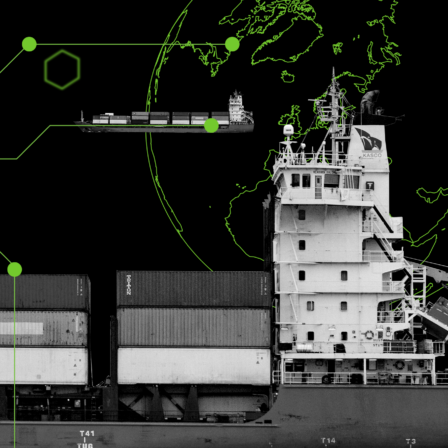A data space, Data space A set of mutually agreed principles and rules for sharing and exchanging data within or between different sectors. Open term page Data space also known as data spaces or a decentralised platform business, is a tool that accelerates and scales data sharing between companies, creating innovations and new services at the ecosystem level.
Five pilot projects in four data spaces developed data products or services related to their data sharing use cases. Each data product or service has its own unique value drivers that lead to different business models.
- The maritime data space initiative grouped the Virtual Port Arrival (VPA) and Just-in-Time (JIT) arrival, developing new data products to reduce fuel consumption and CO2 emissions. This development used virtual queueing and ship speed optimisation.
- The air cargo logistics initiative strove to identify business use cases to enhance the cargo operation at Helsinki Airport. An example of this was sharing cargo packaging dimensions data between all participants in order to improve the use of cargo spaces and planning.
- The skills data space initiative developed an artificial intelligence tool to benchmark and compare the skills needed within a company or sector. The result was improved human resources planning and talent development.
- The Potato-X agriculture data space initiative integrated three working environments, enabling farmers to access machinery data from the machine manufacturer to improve the yield of their crops.
Sitra co-funded five data space pilot projects as a part of the Gaia-X Finland hub. The participating initiatives were conducted in collaboration with Taival Advisory.
Key findings of the pilot projects
1) Data ecosystem value-sharing by design
A crucial part of data ecosystem building is to ensure all participants understand and participate in the value creation, value capture, and value sharing. This also includes building consensus on how the gain will be shared amongst participants. This is initially done by considering the business model of each participant separately, and later as one data ecosystem. This is the foundation work for business modeling and business continuity.
2) New data products and business models
The data ecosystem enables access to previously unavailable data and allows participants to combine this data with other data sets to gain new insights. Often this results in the development of new services or data products. The type of data product defines the development of the business models. Examples of data products could be analytics, AI-enabled services, digital twins, and digital product passports.
3) 20/80 rule
When carrying out business modelling, it is not necessary to have exact data points to be able to start. The purpose is to understand the assumptions behind each value driver and to validate them. The working and sensitivity of key variables within the business model need to be understood.
4) Fairness and value broker
In a data ecosystem, gain can either be distributed fairly, or distributed unequally. In the latter case, a neutral value broker should be involved to declare and redistribute the value. Often, such roles filled by the data ecosystem orchestrator and agreed within the governance structure. Alternatively, an external neutral party can be appointed.
5) Pricing the value
Identifying and evaluating who the customers are and the value created by the new services or data products is key for product pricing. Traditional models based on a cost-plus profit margin often underprice such services or products, making it difficult to share the gain across the data ecosystem.
Recommendations
It is important to lead with business use cases and work from there to define the business value of the new services or data products enabled by the data ecosystem. It is essential to understand the motivation and incentive of each participant, and how financial benefits from the gain could flow between participating stakeholders.
It is necessary to think beyond the current setup and understand the problem the data products are solving. Understanding the value created by the products enables value-based pricing to be applied. It is important to understand the market potential and size, the optimum distribution channels, and opportunity to scale.
These findings could be a useful guide in helping you to develop new data products, validate the assumptions and test the business models. While reflecting on the findings, the interplay with other building blocks of the data ecosystem can also be considered such as technical, legal, and governance issues.



